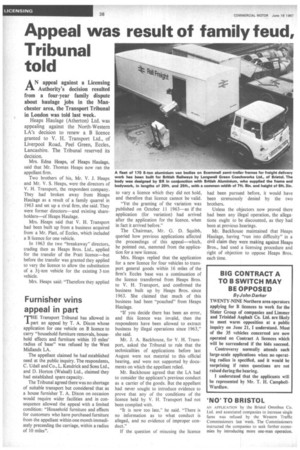Appeal was result of family feud, Tribunal told
Page 40

If you've noticed an error in this article please click here to report it so we can fix it.
AN appeal against a Licensing Authority's decision resulted from a four-year family dispute about haulage jobs in the Manchester area, the Transport Tribunal in London was told last week.
Heaps Haulage (Atherton) Ltd. was appealing against the North-Western LA's decision to renew a B licence granted to V. H. Transport Ltd., of Liverpool Road, Peel Green, Eccles, Lancashire. The Tribunal reserved its decision.
Mrs. Edna Heaps, of Heaps Haulage, said that Mr. Thomas Heaps now ran the appellant firm.
Two brothers of his, Mr. V. J. Heaps and Mr. V. S. Heaps, were the directors of V. H. Transport. the respondent company. They had broken away from Heaps Haulage as a result of a family quarrel in 1963 and set up a rival firm, she said. They were former directors—and existing shareholders—of Heaps Haulage.
Mrs. Heaps said that V. H. Transport had been built up from a business acquired from a Mr. Platt, of Eccles, which included a B licence for one vehicle.
In 1963 the two "breakaway" directors, trading then as Heaps Bros. Ltd., applied for the transfer of the Pratt licence—but before the transfer was granted they applied to vary the licence to allow the substitution of a 3+-ton vehicle for the existing 3-ton vehicle.
Mrs. Heaps said: "Therefore they applied to vary a licence which they did not hold, and therefore that licence cannot be valid.
"Yet the granting of the variation was published on October 11 1963—as if the application (for variation) had arrived after the application for the licence, when in fact it arrived before."
The Chairman, Mr. G. D. Squibb, queried how previous applications affected the proceedings of this appeal—which, he pointed out, stemmed from the application for a new licence.
Mrs. Heaps replied that the application for a new licence for four vehicles to transport general goods within 16 miles of the firm's Eccles base was a continuation of the licence transferred from Heaps Bros. to V. H. Transport, and confirmed the business built up by Heaps Bros. since 1963. She claimed that much of this business had been "poached" from Heaps Haulage.
"If you decide there has been an error, and this licence was invalid, then the respondents have been allowed to extract business by illegal operations since 1963," she said.
Mr. J. A. Backhouse, for V. H. Transport, asked the Tribunal to rule that the technicalities of applications before last August were not material to this official hearing, and were not supported by documents on which the appellant relied.
Mr. Backhouse agreed that the LA had to consider the applicant's previous conduct as a carrier of the goods. But the appellant had never sought to introduce evidence to prove that any of the conditions of the licence held by V. H. Transport had not been complied with.
"It is now too late," he said. "There is no information as to what conduct is alleged, and no evidence of improper conduct."
If the question of misusing the licence had been pursued before, it would have been strenuously denied by the two brothers.
Unless the objectors now proved there had been any illegal operation, the allegations ought to be discounted, as they had been at previous hearings.
Mr. Backhouse maintained that Heaps Haulage, having "run into difficulty" in a civil claim they were making against Heaps Bros., had used a licensing procedure and right of objection to oppose Heaps Bros. each time.




































































































































